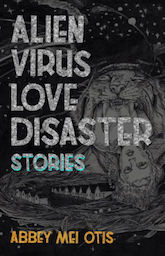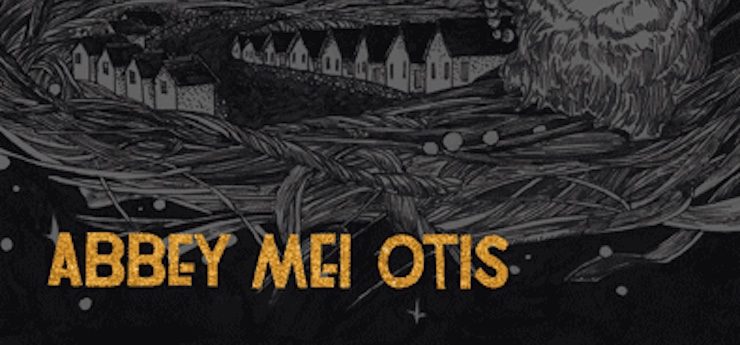Abbey Mei Otis’s first long-form collection, Alien Virus Love Disaster: Stories, is a powerful debut volume published by the perennially impressive Small Beer Press. The book contains twelve stories with publication dates spanning the past eight years, including “Sweetheart” which appeared on Tor.com in 2010. Otis’s fiction has a dynamic blend of contemporary and speculative approaches, diamond-edged and furious in her exploration of power, oppression, and grief.
The titular story also serves as a statement of themes: outsider or abject characters; viral, haunting, gruesome physicality; hunger mixed with passion and crooked adoration; cataclysm before-during-and-after. It isn’t a pleasant or simple experience for the audience. The bodies in Otis’s short fiction are subject to a grim though often lyrical brutality, one step too far for comfort at all times, and their suffering does not generally lead to a positive outcome.
Buy the Book


Alien Virus Love Disaster: Stories
Otis’s stories fracture reality through a prism of potential—and universally horrible—logical outcomes, pointing to the possible (or probable) failures embedded in the current accepted beliefs, systems, and expectations of the social order. These futures are all possible impossibilities, extrapolations to the nth degree based on the struggles of the here and now: extreme disparities in wealth, time-wasting labor for the underclass, pollution and poison from manufacturing spewed into poor neighborhoods, the animal realities of a flesh body and its wounds/desires/exploitability, and so on.
We recognize it all. It recognizes us. Otis’s prose brings the intense affect of her stories not simply to life but to embodiment—it’s the kind of phrasing and artistry that a reader feels in their guts. Calling it “body horror” doesn’t quantify the full extent of the visceral detail Otis gives through her protagonists’ often-internal, often-narrow point of view. However, the horror of bodies is a throughline in almost all of the stories in the collection: bodies as they are infected or changed, such as in “Alien Virus Love Disaster” or “Blood, Blood,” bodies that are commodified (“Sex Dungeons for Sad People”), bodies that keep on ticking though the world around them has collapsed (“Not an Alien Story” and “Moonkids”).
Embodiment crosses intersections of labor, in Otis’s stories, but also other kinds of production: sexual and emotional, specifically. The emotional experiences of these characters are not separated from their flesh, even when they wish that could be the case like the narrator of “Blood, Blood.” Otis is not speculating in the form of a thought experiment. She is recording a lived existence with dirt, hunger, and sorrow down to the cellular level. It’s something I don’t see enough of in SF but she’s got it on lock. These people feel like people, and it makes their suffering almost unbearable to read.
But purposeful. There’s a political and social purpose to this kind of gruesomeness. Otis isn’t wallowing or shocking the reader. She’s not here to provoke a titter of excitement or taboo. Somehow, she manages to render even the sensual and grimy aspects of her stories with an empathetic, internal shade. The reader isn’t observing from the outside, they’re experiencing from the inside, and that makes a world of difference in the thematic argument of this kind of hard-edged work.
The weakest of the stories is, ironically, the one that does this least well: “Sweetheart,” a brief meditation on a theme rather than the bodied experience of the other pieces. It is also one of the earliest pieces collected here, so through comparison, watching Otis’s work evolve is engaging as well. The blistering skill for observation is still present in the minor details of the characters’ actions and words, but the emotional heft isn’t there yet. However, it very much is in “Rich People.” I had to put the book down for awhile after that one, I was filled with such an incandescent rage and grief. That’s skill, the ability to render Suya’s cruelty to her disappeared husband’s baby and aged mother, her desperation that has slipped past desperation into freefall, the freefall that allows her to simple walk straight into a a garden-party of humans so wealthy that they slaughter exotic animals to sleep inside their carcasses and bond in the viscera.
Again: there is a world of skill in being able to write viscera without descending into shock-jock territory. Otis has that skill.
Another method she uses to evoke her material is abrupt shifts in genre. Kafkaesque sweeps of the fantastic crash into otherwise mimetic stories to create a poetry of dissonance and decay, such as in the brief “Teacher.” The piece dissolves from a scene that could occur in a further-collapsed, near-future version of our current school system to an allegorical, hallucinatory description of diving into the maw of a student’s infected, crumbling mouth to escape a hoard of unquiet dead. These moments of dissolution, of unmooring from even the speculative reality of the narrative structure, contain the most affect. Otis is howling into the void in these pieces and dragging us with her, unearthing a horror that is difficult to reach with realist fiction.
The strength in merging genres and expectations and tropes is this: being able to get at something deeper. Use all the tools in the box to make something new. Alien Virus Love Disaster: Stories does that and does it well with a provocative, gruesome outlook. Otis is staring straight at the ugliest of our possibilities and offering them to the reader as if to say, “change this, change this.” There’s a healthy dose of fear and disgust, anxious even in moments of beauty like the erotic clash in “Moonkids,” but it’s a set of emotions that feel right for the current moment. It’s a collection that will keep your heart half in your throat and half in your toes, and I recommend it.
Alien Virus Love Disaster: Stories is available August 14th from Small Beer Press.
Lee Mandelo is a writer, critic, and editor whose primary fields of interest are speculative fiction and queer literature, especially when the two coincide. They have two books out, Beyond Binary: Genderqueer and Sexually Fluid Speculative Fiction and We Wuz Pushed: On Joanna Russ and Radical Truth-telling, and in the past have edited for publications like Strange Horizons Magazine. Other work has been featured in magazines such as Stone Telling, Clarkesworld, Apex, and Ideomancer.










